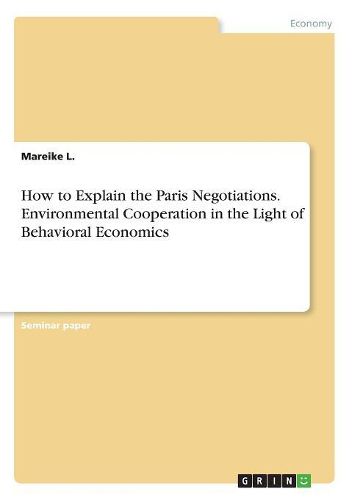Readings Newsletter
Become a Readings Member to make your shopping experience even easier.
Sign in or sign up for free!
You’re not far away from qualifying for FREE standard shipping within Australia
You’ve qualified for FREE standard shipping within Australia
The cart is loading…






Seminar paper from the year 2017 in the subject Economy - Environment economics, grade: 1,7, University of Porto (Faculdade de Economia), course: Environmental Economics and Sustainable Development, language: English, abstract: One of the biggest challenges of the globalized world is still the establishment and maintenance of international cooperation. The growing interdependency produced by cross-border externalities demand for joint actions in an anarchic world order. The United Nations (UN) or the international economic system, consisting of the World Bank, the International Monetary Funds (IMF) and the World Trade Organization (WTO), are some examples of mostly successful supranational forms of cooperation. What those institutions not include is the threat of climate change, which is today's biggest challenge of international matter. With its Report "Limits to Growth" from the year 1972, The Club of Rome not only put the subject of climate change for the first time on the political and scientific agenda but also raised the public awareness of this problem. From this point on, ongoing efforts were made to commonly regulate emissions and control the sustainability of climate goods. Nevertheless, the first binding agreement on climate change, the Paris Agreement, entered into force 44 years after this report, on the 4th of November 2016. For some political and economic theorists this is no surprise. Following the assumptions of the economic game theory and global governance-approaches, non-cooperative behavior is the consequence of rational decision making. Basic dilemma situations depict the competition about non-excludable goods and foresee the challenges of global climate negotiations. The latest success on the Climate Conference in Paris challenges these assumptions and raises new questions about human cooperative behavior. While this matter has its origins in the neoclassical approach of game theory, behavioral economists started to examine the phenomenon and
$9.00 standard shipping within Australia
FREE standard shipping within Australia for orders over $100.00
Express & International shipping calculated at checkout
Seminar paper from the year 2017 in the subject Economy - Environment economics, grade: 1,7, University of Porto (Faculdade de Economia), course: Environmental Economics and Sustainable Development, language: English, abstract: One of the biggest challenges of the globalized world is still the establishment and maintenance of international cooperation. The growing interdependency produced by cross-border externalities demand for joint actions in an anarchic world order. The United Nations (UN) or the international economic system, consisting of the World Bank, the International Monetary Funds (IMF) and the World Trade Organization (WTO), are some examples of mostly successful supranational forms of cooperation. What those institutions not include is the threat of climate change, which is today's biggest challenge of international matter. With its Report "Limits to Growth" from the year 1972, The Club of Rome not only put the subject of climate change for the first time on the political and scientific agenda but also raised the public awareness of this problem. From this point on, ongoing efforts were made to commonly regulate emissions and control the sustainability of climate goods. Nevertheless, the first binding agreement on climate change, the Paris Agreement, entered into force 44 years after this report, on the 4th of November 2016. For some political and economic theorists this is no surprise. Following the assumptions of the economic game theory and global governance-approaches, non-cooperative behavior is the consequence of rational decision making. Basic dilemma situations depict the competition about non-excludable goods and foresee the challenges of global climate negotiations. The latest success on the Climate Conference in Paris challenges these assumptions and raises new questions about human cooperative behavior. While this matter has its origins in the neoclassical approach of game theory, behavioral economists started to examine the phenomenon and